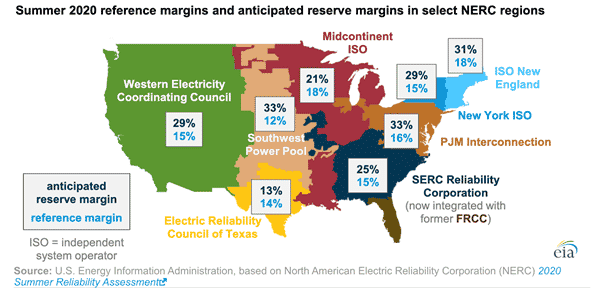NERC Anticipates Adequate Resources to Meet Summer Electricity Demand Across Most of U.S.

The North American Electric Reliability Corporation anticipates sufficient resources to meet this summer’s projected peak electricity demand in most areas of the U.S. despite the uncertainty caused by efforts to curb the spread of the COVID-19 pandemic, according to a July 7 report from the U.S. Energy Information Administration.
The corporation, which oversees regional electric reliability entities in the Lower 48 states, Canada, and parts of Mexico recently released its 2020 Summer Reliability Assessment. The report identifies areas of concern regarding the reliability of the North American bulk power system for the summer season. The agency measures reliability with anticipated reserve margin and planning reference margins for each region. The anticipated reserve margin refers to the electric generating capacity that would be available to serve as a buffer to some unexpected changes. Typically, reliability entities will set the anticipated reserve margins higher than the planning reference margins.
The anticipated reserve margin of the Electric Reliability Council of Texas Inc., which is typically one of the smallest in the nation, has increased from 8.5 percent in summer 2019 to 12.9 percent for the upcoming summer, following the addition of over 1.9 gigawatts of on-peak resource capacity. The Texas grid operator assumes it is capable of importing up to 817 megawatts during its forecast peak load hours and reports that operations expected to come online before this summer did not face any COVID-19-related delays.
The Southeast Reliability Corporation, which covers 350,000 square miles and serves a population of around 69 million, is estimated to have a total internal electricity demand of 181 gigawatts, making it the largest assessment area.
Due to the COVID-19 pandemic, electricity demand has reduced and consumption patterns have also changed in many areas of the country, according to the report. Some maintenance work on electric system infrastructure has been deferred or canceled by the grid operators because of the pandemic mitigation efforts, which brings some risk to electricity reliability.
EnerKnol Pulses like this one are powered by the EnerKnol Platform—the first comprehensive database for real-time energy policy tracking. Sign up for a free trial below for access to key regulatory data and deep industry insights across the energy spectrum.
ACCESS FREE TRIAL